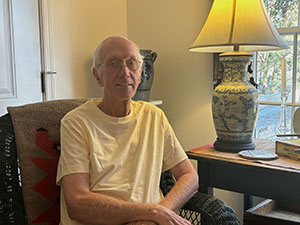 Army veteran Frank Bennett was accustomed to traveling from the Pentagon to Walter Reed Army Medical Center. The Vietnam veteran began a recurring event, in 2003, bringing dozens of wounded service members and their families to the Pentagon for a special ceremony honoring their service and sacrifice.
Army veteran Frank Bennett was accustomed to traveling from the Pentagon to Walter Reed Army Medical Center. The Vietnam veteran began a recurring event, in 2003, bringing dozens of wounded service members and their families to the Pentagon for a special ceremony honoring their service and sacrifice.
“We’d pack a whole side of the building plus half,” said Bennett. “It was the largest monthly held event for over a decade.”
So, when the event coordinator at Walter Reed noticed Bennett struggling with a persistent back problem and chronic skin condition that stretches back to Vietnam, he was introduced to DAV.
“This is a Vietnam veteran who was taking care of veterans from more current wars,” said DAV benefits advocate Danny Soto. “Nobody else was really watching out for him and watching what was going on until the event coordinator.”
Bennett was drafted into the Army in 1968. The issues with his spine began just three weeks into basic training when he injured his back. However, it was the jeep accident in Vietnam that caused even more pain.
“We got run off the road by a deuce and a half trying to avoid what they thought was a road bomb,” said Bennett. “My back went out really bad then, but I had to get it back on the road; we got bumped around quite a bit.”
Despite the incident, he volunteered to extend his tour in Vietnam. Upon his return to an Army base in Virginia, he sought out civilian care for his back and rashes that kept returning.
Thankfully, he kept receipts and notes from the 1970s, which strengthened the Department of Veterans Affairs claim Soto submitted—Bennett’s first—for the back issues and the recurring skin condition.
Rashes, sores, cysts and ulcers have all been removed off Bennett’s face, ear, back, shoulders and neck. “I’ve had stuff removed for 25, 30 years, either freezing it off or another removal,” added Bennett.
Bennett has used his insurance and paid out of pocket to treat these ailments.
The VA immediately ordered exams, which resulted in a confirmed diagnosis of spondylolisthesis, a condition where one vertebra slips forward over the one below.
The claim came back favorably. However, Soto noticed a near-constant tremor in Bennett’s hand. On the advice of Soto, he sought out a neurologist who diagnosed Bennett with early-stage Parkinson’s Disease, a presumptive for Agent Orange exposure. Early intervention and treatment of Parkinson’s can lead to minimizing symptoms, slow the progression of the disease and improve a patient’s overall quality of life.
“I’m grateful, honestly, that he was able to catch it early,” added Soto. “I said to keep giving me the records; by the time they rate this, they will be shocked at how much it progressed.”
That claim was approved beyond anything Bennett thought was possible. “Danny went out of his way for me,” said Bennett. “I was stunned, I was speechless. It happened so fast.”
“He was so surprised, he didn’t know what to do next,” added Soto. “I said, ‘you’re going to get free, earned health care, that’s what you’re going to do.’”






